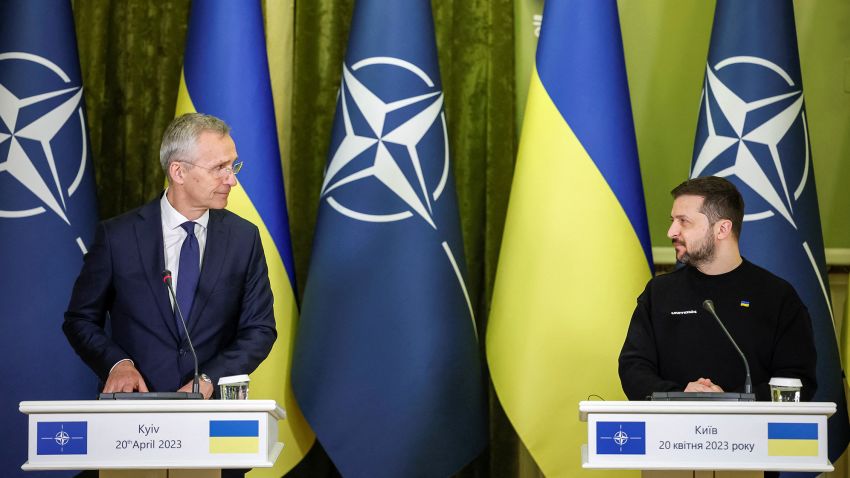Trump's Skepticism: Ukraine's Path To NATO Membership In Question

Table of Contents
Trump's Stance on NATO and Ukraine
Questioning the Value of NATO
Trump's criticisms of NATO were consistent throughout his presidency. He frequently questioned the alliance's value, particularly focusing on what he perceived as unfair burden-sharing among member states. His transactional approach to international relations led him to view NATO less as a collective security arrangement and more as a series of bilateral deals.
- Examples of Trump's skepticism: He repeatedly called NATO "obsolete," demanding increased financial contributions from European members.
- Concerns about financial contributions: Trump publicly pressured allies to increase their defense spending to meet the agreed-upon 2% of GDP target, often framing the issue as a matter of financial fairness rather than collective security.
- Transactional approach: His focus on bilateral deals rather than multilateral cooperation undermined the principles of collective defense that underpin NATO's structure.
Doubt Regarding Ukraine's Readiness
Beyond his general skepticism towards NATO, Trump also expressed doubts about Ukraine's preparedness for membership. These concerns often revolved around issues of internal corruption and military capabilities.
- Specific instances of doubt: Trump's administration occasionally downplayed the threat posed by Russia to Ukraine, suggesting that Ukraine needed to undertake significant internal reforms before considering NATO membership.
- Reforms needed for NATO compliance: The administration emphasized the need for Ukraine to tackle corruption, strengthen its democratic institutions, and improve its military capacity to meet NATO standards.
- Perceived vulnerability: The Trump administration seemed to view Ukraine as inherently vulnerable and questioned whether NATO membership would offer sufficient protection.
Geopolitical Implications of Trump's Skepticism
Impact on Russia-Ukraine Relations
Trump's reluctance towards Ukraine's NATO bid arguably emboldened Russia. His perceived hesitation on the issue might have contributed to increased Russian aggression in the region.
- Potential link between Trump's stance and escalating tensions: Some analysts argue that Trump's ambiguous stance on NATO sent a signal to Russia that a US-led response to further aggression in Ukraine was unlikely.
- Russia's response to Trump's perceived weakness: Russia may have interpreted Trump's skepticism as a sign of weakness in the West's commitment to Ukraine's sovereignty and territorial integrity.
- Impact on the annexation of Crimea and the conflict in Donbas: The ongoing conflict in eastern Ukraine and the annexation of Crimea occurred during Trump's presidency, creating a challenging backdrop for discussions of Ukraine's NATO membership.
Effect on European Security
Trump's skepticism towards NATO and his questioning of the alliance's value had broader implications for European security. His approach undermined the transatlantic alliance and raised concerns among European allies.
- Weakening of collective defense mechanisms: Trump's emphasis on bilateral deals and his questioning of collective defense principles raised doubts about the reliability of the US security guarantee for European allies.
- Concerns raised by European allies: European leaders expressed concerns about Trump's willingness to uphold the core principles of the transatlantic alliance, including collective defense.
- Impact on European unity and defense spending: While Trump pushed for increased defense spending in Europe, his approach often created division and strained relationships within the alliance.
The Current State of Ukraine's NATO Aspirations
Post-Trump Administration Developments
The Biden administration has adopted a markedly different approach to Ukraine's NATO ambitions. There has been a renewed emphasis on supporting Ukraine's sovereignty and territorial integrity.
- Key policy changes: The Biden administration has significantly increased military and financial aid to Ukraine and has reaffirmed its commitment to the principle of collective defense.
- Current level of US support: The US is now a strong supporter of Ukraine's aspirations for NATO membership, although the timeline for potential membership remains uncertain.
- Recent statements and actions: The Biden administration has consistently condemned Russian aggression and has worked with allies to impose sanctions on Russia.
Challenges and Opportunities for Ukraine
Despite increased support from the US and other allies, Ukraine still faces significant challenges in its pursuit of NATO membership.
- Internal reforms: Ukraine needs to continue its efforts to combat corruption, strengthen its democratic institutions, and reform its military.
- Geopolitical obstacles: Russia's continued aggression and its influence over neighboring countries remain significant obstacles.
- Pathways for achieving NATO membership: Ukraine's path to NATO membership is likely to involve a gradual process of reforms and closer cooperation with the alliance.
- Factors such as public opinion and domestic political stability: Domestic political stability and strong public support for NATO membership are crucial for Ukraine's success.
Conclusion: Trump's skepticism regarding Ukraine's NATO membership had profound and lasting implications for Ukraine's security and its relationship with the West. His doubts, rooted in concerns about NATO's effectiveness and Ukraine's readiness, created uncertainty and potentially emboldened adversaries. While the Biden administration has demonstrated increased support, significant challenges remain for Ukraine's path toward NATO integration. Understanding the lingering effects of Trump's stance is crucial for analyzing Ukraine's future and its place within the broader geopolitical landscape. Further research into Ukraine NATO membership is essential to fully comprehend the complexities of this ongoing situation. Continued monitoring of Ukraine NATO membership developments is vital.

Featured Posts
-
 Microsofts Approach To Ethical Ai Design A Human First Perspective
Apr 26, 2025
Microsofts Approach To Ethical Ai Design A Human First Perspective
Apr 26, 2025 -
 Designing For Humanity In The Age Of Ai A Conversation With Microsoft
Apr 26, 2025
Designing For Humanity In The Age Of Ai A Conversation With Microsoft
Apr 26, 2025 -
 Anchor Brewings Legacy Closing Its Doors After 127 Years
Apr 26, 2025
Anchor Brewings Legacy Closing Its Doors After 127 Years
Apr 26, 2025 -
 Federal Investigation Millions Stolen Through Office365 Executive Account Hacks
Apr 26, 2025
Federal Investigation Millions Stolen Through Office365 Executive Account Hacks
Apr 26, 2025 -
 Bmw Porsche And The Complexities Of The Chinese Automotive Market
Apr 26, 2025
Bmw Porsche And The Complexities Of The Chinese Automotive Market
Apr 26, 2025
